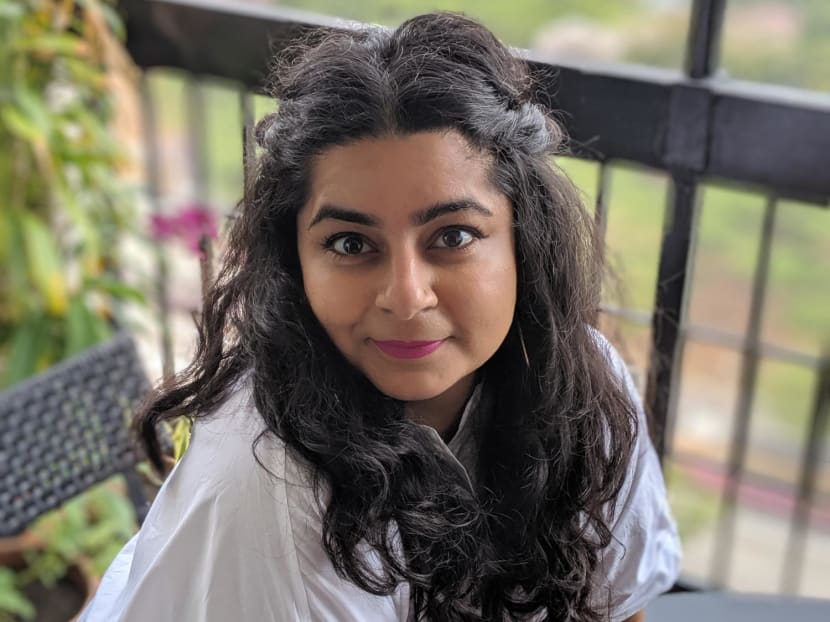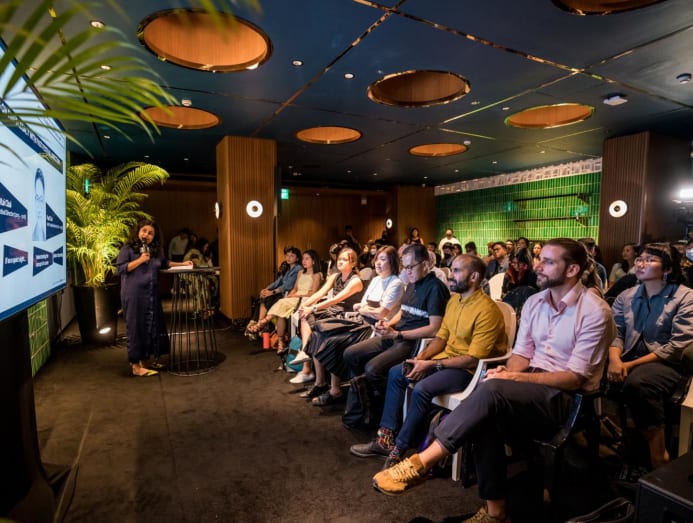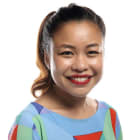Directing the Singapore Writers Festival as a racial and gender minority ‘hits differently’: Pooja Nansi
It’s been three years since the Singapore Writers Festival appointed its first female director. CNA Women catches up with Pooja Nansi to see where she’s at with her mission to democratise the arts.

A literary festival must reflect the community it is rooted in, says the Singapore Writers Festival director Pooja Nansi. (Photo: Arts House Limited)
The first time Pooja Nansi read the Sylvia Plath confessional, Daddy, she was struck by its fury.
At the age of 13, she didn’t really understand what the poem was about but its emotional burn was palpable.
“I didn’t get all the references – in fact, I still don’t completely get the poem today – but I could sense the rage. Those last few lines ‘Daddy, daddy, you bastard, I’m through’ had me reeling. I thought ‘oh my God, are you allowed to say that?’” she said.
The 40-year-old author was speaking a few weeks ahead of the media launch of the upcoming Singapore Writers Festival (SWF), for which she is curator-in-chief. The festival opens on Friday (Nov 4) and runs until Nov 20.
She told CNA Women that when then-festival director Yeow Kai Chai floated the idea of her taking over from him, she thought it was “insane” and that there was “no way” she could do it.
It’s not like she didn’t qualify.
Since that fateful reading of one of the world’s most controversial poets, she had been writing her own poetry. As an undergraduate, she often attended the poetry slams organised by non-profit organisation Word Forward at dance club Velvet Underground.

Over the years, she would go on to form her own spoken word and music duo Mango Dollies, and start a monthly poetry reading event series called Speakeasy at the now-defunct cafe Artistry.
In 2017, she was named Singapore’s first Youth Poet Ambassador.
She has written three collections of poetry, the last of which – We Make Spaces Divine – made her the first minority woman to be nominated for the Singapore Literature Prize (SLP) in the English poetry category in 2022.
“A SEA OF MEN”
But being the festival director of the SWF was a different thing altogether.
For one, she would be the first female director in its 36-year history.
Nansi had suggested when she was shortlisted for the country’s top literature prize that she was “tired of being the first … to be in places”.
“Sometimes I think we’ve come a long way and yet other times I am reminded that we have a long way to go,” she had written in an Instagram post in July, pointing out that the first time a woman won the award for English poetry was in 2020. The SLP was given to Marylyn Tan for her debut volume, Gaze Back.
“I think by now, if we’re still having to describe something as being the first, it’s a sign of backwardness. It’s more ‘it’s about time’ than something to be celebrated,” Nansi told CNA Women.
I think by now, if we’re still having to describe something as being the first, it’s a sign of backwardness
Fortunately, Nansi saw the SWF role for what it was – an opportunity not just to change people’s perception of literature but to democratise the arts across gender, race and age.
And since taking over from Yeow in 2019, she’s been playing catch-up.
“I’m always cognisant of the presence of women in our literary scene,” said Nansi.
“One of the things that struck me was that every edition of the SWF has celebrated a literary pioneer but for the longest time, there had only been one woman in a sea of men,” she added.
That was in 2017, when the festival showcased the illustrious career of Cultural Medallion recipient Anne Lee Tzu Peng.
“I had to do something about that,” said Nansi.
So last year, SWF’s first fully digital edition celebrated Hedwig Anuar, Singapore’s pioneering librarian.
“She’s a legend … It astounded me that we had not yet celebrated this woman.”
This year, the SWF’s Literary Pioneer Exhibition will be the first showcase in Singapore of pioneering Malay women writers, commemorating the life and works of Adibah Amin, Hadijah Rahmat, Raja Aisyah Sulaiman, Rasiah Halil and Sa’eda Buang.
The exhibition will also feature Kumpulan Bebas Melata, a collective of Malay poets and authors across Southeast Asia, set to publish their 18th anthology of poems.
Nansi believes it is on her to “make sure we don’t forget that women played a very equal part” in building Singapore’s literary scene.
“I occupy this space as a twice-minority – I’m a racial minority and a woman. So I’m constantly looking at diversity. Former directors have already been sensitive to that but it hits differently when you occupy that body yourself,” she said.
To do this work, Nansi said it was important for her to reflect on what a literary festival is supposed to do.
“I think what it should do is serve the community it is rooted in. It should reflect our city and it should make space for everyone. Part of the ethos of my curation is to make the space bigger.
“How can we have more people in this space? How can we include more voices? How can we make this relevant to more people? Who’s not coming and why aren’t they showing up? What do we need to include that they want to come and see?
“These are questions we need to ask, even if it’s not easy to get the answers to them. That has been my experiment in the past few years and though it has ruffled a few feathers, it’s non-negotiable. I have to make it more democratic,” she said.
YOUNG PEOPLE ENGAGING MORE THAN EVER
Nansi believes she is working at the helm of a somewhat revolutionary time in history.
Public libraries may not be as full as they used to be and people are more likely to have their face buried in their phone than physical books, but “young people are reading and writing, and engaging with texts more than ever before”.
“The #BookTok trend on social media is huge and has led to a revival of reading culture. People are bringing poetry to every medium possible. If you want an indication that poetry is alive and well just look for a poet on Instagram – you’ll see that their followers are in the tens of thousands,” said Nansi.
I occupy this space as a twice-minority – I’m a racial minority and a woman. So I’m constantly looking at diversity
It’s exciting – and encouraging.
“Despite its reputation for being ‘cheem’, I truly believe that poetry is a democratic space, relevant to each and every one of us,” said Nansi.
“I wish people would be less concerned about wanting to know what a poem means. I always tell people to think about a song lyric that’s stuck with them – poetry is like that. Just read it. You never know what in the poem will stick in your heart or change your mind about something,” she added.
“You don’t have to beat the meaning out of a poem – you can just enjoy it.”
SWF is not all Nansi has her hands full with these days. There’s also Nyra, her daughter.
Before becoming a mother, Nansi said she used to worry about introducing a child into her life.
“I had this big fear that having a child would not give me the time and headspace to be an artist, a creative person,” she told CNA Women. But as with many parents, she adjusted.
“Before Nyra, I would dedicate two hours to creative work, but if I felt like watching Netflix, I would. Now, I’m more focused and targeted. If I only have two hours to myself, I will make use of them,” she said.
The sometime creative writing lecturer delights in the idea that Nyra is already “obsessed with books” but isn’t fussed about her two-year-old following in her footsteps.
“Her taste is eclectic. She has a different favourite every day. She has this book about a hungry monster that wants a pizza but can’t get it delivered and she has a cute picture book about the history of rap.
“It’s very fun to watch her learn about the world. But my current job is to give her space to explore, and to keep her alive and safe.”
CNA Women is a section on CNA Lifestyle that seeks to inform, empower and inspire the modern woman. If you have women-related news, issues and ideas to share with us, email CNAWomen [at] mediacorp.com.sg.







